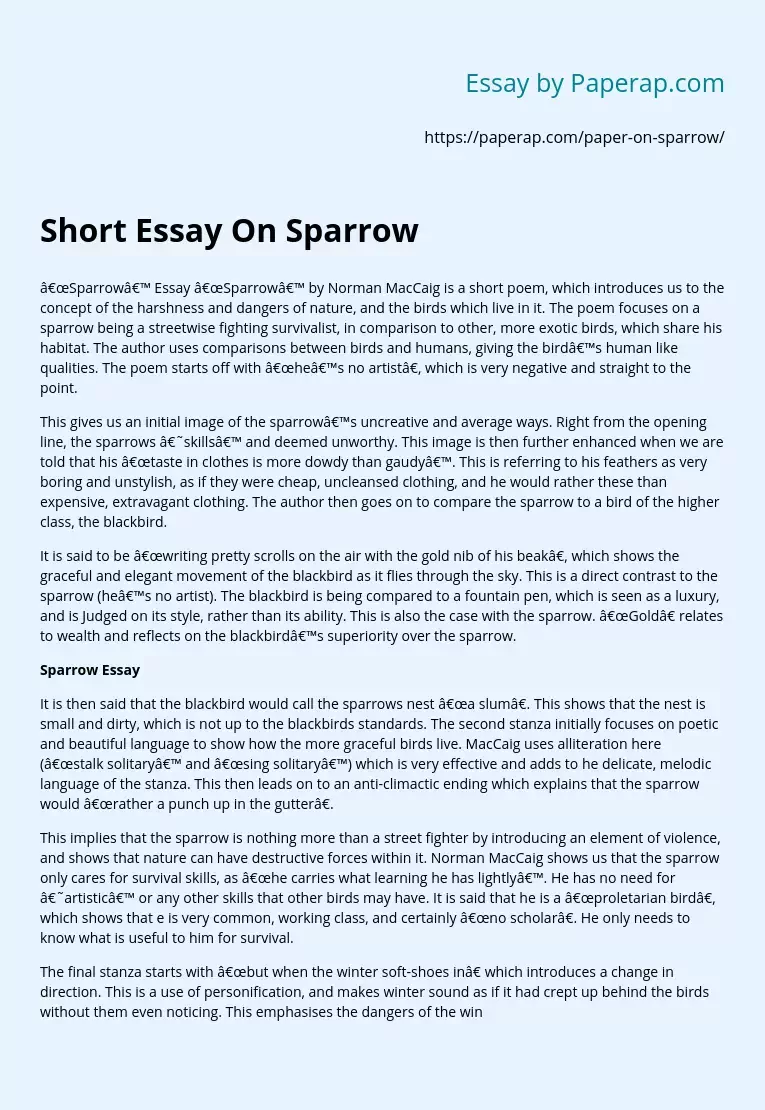Short Essay On Sparrow
“Sparrow’ Essay “Sparrow’ by Norman MacCaig is a short poem, which introduces us to the concept of the harshness and dangers of nature, and the birds which live in it. The poem focuses on a sparrow being a streetwise fighting survivalist, in comparison to other, more exotic birds, which share his habitat. The author uses comparisons between birds and humans, giving the bird’s human like qualities. The poem starts off with “he’s no artist”, which is very negative and straight to the point.
This gives us an initial image of the sparrow’s uncreative and average ways. Right from the opening line, the sparrows ‘skills’ and deemed unworthy. This image is then further enhanced when we are told that his “taste in clothes is more dowdy than gaudy’. This is referring to his feathers as very boring and unstylish, as if they were cheap, uncleansed clothing, and he would rather these than expensive, extravagant clothing. The author then goes on to compare the sparrow to a bird of the higher class, the blackbird.
It is said to be “writing pretty scrolls on the air with the gold nib of his beak”, which shows the graceful and elegant movement of the blackbird as it flies through the sky. This is a direct contrast to the sparrow (he’s no artist). The blackbird is being compared to a fountain pen, which is seen as a luxury, and is Judged on its style, rather than its ability. This is also the case with the sparrow.
“Gold” relates to wealth and reflects on the blackbird’s superiority over the sparrow.
Sparrow Essay
It is then said that the blackbird would call the sparrows nest “a slum”. This shows that the nest is small and dirty, which is not up to the blackbirds standards. The second stanza initially focuses on poetic and beautiful language to show how the more graceful birds live. MacCaig uses alliteration here (“stalk solitary’ and “sing solitary’) which is very effective and adds to he delicate, melodic language of the stanza. This then leads on to an anti-climactic ending which explains that the sparrow would “rather a punch up in the gutter”.
This implies that the sparrow is nothing more than a street fighter by introducing an element of violence, and shows that nature can have destructive forces within it. Norman MacCaig shows us that the sparrow only cares for survival skills, as “he carries what learning he has lightly’. He has no need for ‘artistic’ or any other skills that other birds may have. It is said that he is a “proletarian bird”, which shows that e is very common, working class, and certainly “no scholar”. He only needs to know what is useful to him for survival.
The final stanza starts with “but when the winter soft-shoes in” which introduces a change in direction. This is a use of personification, and makes winter sound as if it had crept up behind the birds without them even noticing. This emphasises the dangers of the winter season for the birds. The other birds are then identified as “ballet dancers, musicians, architects”. These are the ‘artistic’ birds that, instead of learning basic survival skills, they gracefully fly around ballet dancers), make beautiful music with their songs (musicians), and build impressive nests (architects).
It is this point when the true harsh nature of the winter is revealed, as it is said that these birds “die in the snow and freeze to branches”. Despite all their impressive aspects, they do not have the practical skills like the sparrow. The sparrow inevitably survives the winter, and the other birds are said to “watch him happily flying on the O-levels and A-Levels of the air”. The poet uses humorous irony here, as it relates to school grades. This also once again, relates back o the human comparison, and makes a very effective ending for the poem. Sparrow’ by Norman MacCaig provides us with a different insight into nature, and characterises the sparrow, which would normally be considered as Just another common bird. The poet, through a variety of writing techniques, describes the beauty and harshness of nature, and the character of the sparrow, and other birds. Throughout the poem, MacCaig shows us that there is no shame in being a common, working class person. When danger arises, it is the common man that will have the practical skills, and strength of character to survive.
Short Essay On Sparrow. (2019, Dec 05). Retrieved from https://paperap.com/paper-on-sparrow/

